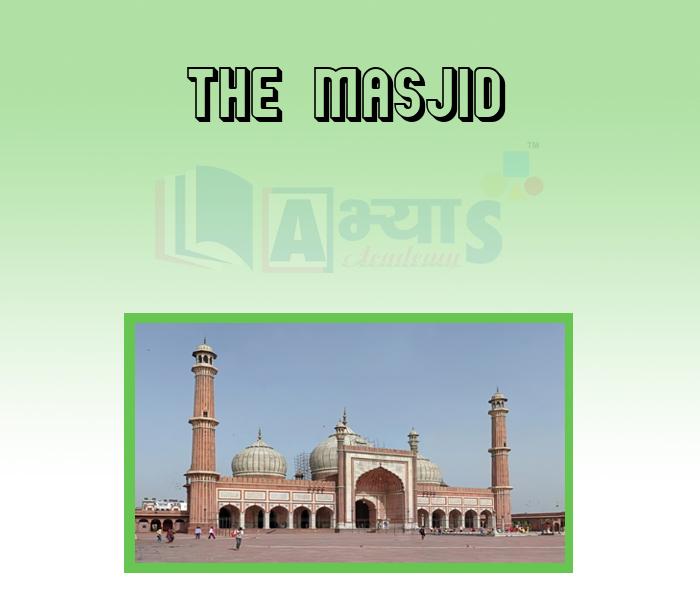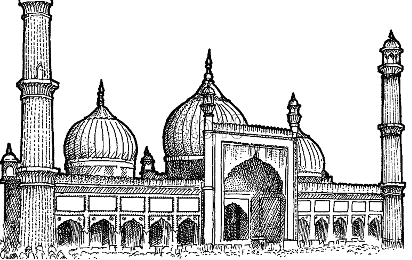The Masjid

The Masjid
The Masjid: A mosque is called a Masjid in Arabic, literally a place where a Muslim prostrates in reverence to Allah. During prayer, Muslims stand facing Mecca. In India this is to the west. This is called the qibla. The Delhi sultans built several mosques in cities all over the subcontinent. These demonstrated their claims to be protectors of Islam and Muslims. Mosques also helped to create the sense of a community of believers who shared a belief system and a code of conduct. It was necessary to reinforce this idea of a community because Muslims came from a variety of backgrounds.
:
The coming of Muslim rulers to India saw the birth of a new style of art and architecture that came to be known as the Indo-Islamic style. Indo -Islamic architecture was a blend of the local Indian style with the Islamic style. Since Islamic art itself was a composite of various influences -Turkish,Afghan,Persian and Arabi -Indo Islamic architecture showcased a wide variety of styles .In Delhi Islamic influences dominated , while in the Deccan ,local styles were more prominent in the buildings.In Bengal , the local rulers practice of using bricks for building continued .Indo -Islamic architecture was also influenced by the fact that the Muslim rulers often had to use Indian craftsmen, who were trained in the local styles.Building were simple ,with symmetrical and beautiful lines. They now featured Islamic elements such as arches and domes. Islam discourages the depiction of human figures in art.
Some of the earliest buildings built by the Muslims in India were their place of worship,or mosques. These shapes were new to India .A mosque has a sihn, an open rectangular courtyard at the center ,surrounded by Liwan, a pillared cloister with several entrances.A domed prayer ball stands at the western end of courtyard . At the back of the prayer hall stands at western end of the courtyard. At the back of the prayer hall is the mihrab (a niche) which indicates the direction of mecca , for the faithful to face while praying. To the right of the mihrab is the mimbar (pulpit) for the iman to conduct prayers. There is also the minar , a high slender tower, from where the Mu'zzain (priest) ca;lls the faithful to prayer.
Students / Parents Reviews [20]
The experience was nice. I studied here for three years and saw a tremendous change in myself. I started liking subjects like English and SST which earlier I ran from. Extra knowledge gave me confidence to overcome competitive exams. One of the best institutes for secondary education.

Aman Kumar Shrivastava
10thIn terms of methodology I want to say that institute provides expert guidence and results oriented monitering supplements by requsite study material along with regular tests which help the students to improve their education skills.The techniques of providing education helps the students to asses...

Aman Kumar Shrivastava
10thAbhyas is a complete education Institute. Here extreme care is taken by teacher with the help of regular exam. Extra classes also conducted by the institute, if the student is weak.

Om Umang
10thA marvelous experience with Abhyas. I am glad to share that my ward has achieved more than enough at the Ambala ABHYAS centre. Years have passed on and more and more he has gained. May the centre flourish and develop day by day by the grace of God.

Archit Segal
7thIt was a good experience with Abhyas Academy. I even faced problems in starting but slowly and steadily overcomed. Especially reasoning classes helped me a lot.

Cheshta
10thMy experience with Abhyas academy is very nice or it can be said wonderful. I have been studying here from seven class. I have been completing my journey of three years. I am tinking that I should join Abhyas Academy in tenth class as I am seeing much improvement in Maths and English

Hridey Preet
9thIt has a great methodology. Students here can get analysis to their test quickly.We can learn easily through PPTs and the testing methods are good. We know that where we have to practice

Barkha Arora
10thThird consective year,my ward is in Abhyas with nice experience of admin and transport support.Educational standard of the institute recumbent at satisfactory level. One thing would live to bring in notice that last year study books was distributed after half of the session was over,though study ...

Ayan Ghosh
8thI have spent a wonderful time in Abhyas academy. It has made my reasoning more apt, English more stronger and Maths an interesting subject for me. It has given me a habbit of self studying

Yatharthi Sharma
10thUsually we see institutes offering objective based learning which usually causes a lag behind in subjective examinations which is the pattern followed by schools. I think it is really a work of planning to make us students grab the advantages of modes of examination, Objective Subjective and Onli...

Anika Saxena
8thAbout Abhyas metholodology the teachers are very nice and hardworking toward students.The Centre Head Mrs Anu Sethi is also a brilliant teacher.Abhyas has taught me how to overcome problems and has always taken my doubts and suppoeted me.

Shreya Shrivastava
8thMy experience with Abhyas academy is very good. I did not think that my every subject coming here will be so strong. The main thing is that the online tests had made me learn here more things.

Hiya Gupta
8thAbhyas academy is great place to learn. I have learnt a lot here they have finished my fear of not answering.It has created a habit of self studying in me.The teachers here are very supportive and helpful. Earlier my maths and science was good but now it has been much better than before.

Barkha Arora
10thAbhyas institute is one of the best coaching institute in the vicinity of Ambala Cantt area. The teachers of the institute are well experienced and very helpful in solving the problems of the students.The good thing of the institute is that it is providing extra classes for the students who are w...

Aman Kumar Shrivastava
10thAbhyas Methodology is very good. It is based on according to student and each child manages accordingly to its properly. Methodology has improved the abilities of students to shine them in future.

Manish Kumar
10thWhen I have not joined Abhyas Academy, my skills of solving maths problems were not clear. But, after joining it, my skills have been developed and my concepts of science and SST are very well. I also came to know about other subjects such as vedic maths and reasoning.

Sharandeep Singh
7thIt was good as the experience because as we had come here we had been improved in a such envirnment created here.Extra is taught which is beneficial for future.

Eshan Arora
8thAbhyas is an institute of high repute. Yogansh has taken admission last year. It creates abilities in child to prepare for competitive exams. Students are motivated by living prizes on basis of performance in Abhyas exams. He is satisfied with institute.

Yogansh Nyasi
7thMy experience with Abhyas Academy has been very good. When I was not in Abhyas whenever teacher ask questions I could not speak it confidently but when I came in Abhyas, my speaking skills developed and now I am the first one to give the answer of teachers question.

Upmanyu Sharma
7thMy experience was very good with Abhyas academy. I am studying here from 6th class and I am satisfied by its results in my life. I improved a lot here ahead of school syllabus.








